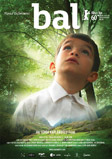AMatthew Stogdon / The Red Right Hand
Angel’s Fall
Just One Wish
An exceptional second film for Istanbul director, Semih Kaplanoglu. This film uses many long singular-cut stark scenes depicting very little actually happening; a truly ‘art house’ movie. The film opens with Zeynep [Özen] walking slowly up a hill with a spool of yellow thread in her hand. Almost like Theseus in the maze of the Minotaur, she appears to be walking off and letting it unravel. Suddenly the string snaps. Zeynep looks distraught and somewhat frantic about this and proceeds to walk all the way back down the hill, to a post covered in thread. She re-wraps the thread around this post and begins to walk back up again. Once again the tiny yellow line breaks and falls, with this she begins to cry and clomps down the hill in her boots, back to the post. Now quite determined, she loops the thread around the post a fair few times and proceeds up the hill again. As she walks off shot the screen hits black and the title appears in a bold yellow font.
Granted this may seem odd to Westerners and you’ll immediately assume that she’s neurotic or obsessive compulsive. It was later when I had a chance to speak with the director that I discovered this was a Turkish tradition around this festive time. He told me that in Istanbul there are these gate posts and women would tie a piece of thread to them and begin to walk up a long winding hill. The thread itself represents a wish or prayer for their God, if they were to reach the top without the thread breaking then God will adhere and grant the wish. Later during the film -on numerous occasions- we see Zeynep playing with the spool, slowly unravelling the thread and muttering quietly to herself. I asked Kaplanoglu if this was a sign of obsession and he said yes, it has now become so important to her and she is so desperate that she practices in her spare time.
The story follows a nature not dissimilar to that of the works of Dostoyevsky. We focus our attention on this one girl, rarely veering off course; only two or three other main characters are introduced. Zeynep lives with her Father, Müfit [Karagöz], a cold man who comes in from work and expects food on the table. They live quietly together except for when he stumbles home drunk and Zeynep has to tend to him or when his urges get the better of him, leading to his abuse of his daughter. Zeynep works in a hotel, cleaning rooms, one of the bell-boys, Mustafa [Dogan] has taken a liking to her and follows her to the train station, then meets her there the next morning. There’s nothing wrong with the guy it’s simply that he likes her and has trouble understanding that she isn’t ready or willing to have a relationship due to the problems and pressures she’s experiencing. The other characters take on an almost side-line plot that bears little-to-no relevance to Zeynep. Further up town lives the young Selçuk [Akalin] with his fiancé, Funda [Bozoglu]. They get into a fight and she leaves him. It’s not clear what exactly happens, I tried to ask Kaplanoglu and from what I gather the plot went like this: Funda leaves Selçuk, taking their car and a suitcase of clothes. Selçuk sleeps with his neighbour. Selçuk wakes in the night to the sound of breaking glass; upon walking into a room he looks despaired. Selçuk mourns the loss of Funda - he told me that we don’t know how she died and that it doesn’t matter, it’s something that Hollywood would focus on, he was more concerned with the impact on Selçuk. Selçuk then goes to the car parked outside and removes the suitcase of clothes - which Zeynep comes to collect. During our little interview Kaplanoglu tried to explain what happened to Funda. He said that although we see her storm off carrying a suitcase, she only made it as far as the car. As Selçuk was seducing his neighbour she snuck back inside and hid in the bathroom. Selçuk then brought his neighbour to his flat and slept with her. Shocked and appalled by this, Funda broke a mirror and slit her wrists.
The real nature of the film comes out within the last twenty minutes. Due to Funda’s death Zeynep collects the clothes and tries them on. They’re high class suits and silk garments that she has worn before, so she begins to root through the case trying everything on - I have to confess this part was a little disturbing. Whilst sitting in a negligee and high-heels, watching TV, Zeynep’s Father comes home. When their eyes meet she runs off to get changed. She returns to him with a meal and he slaps her then proceeds to eat. This part is very powerful, the fact that we stay with Müfit as he eats his meal, rather than following Zeynep who is clearly crying in the other room. Having seen all this we now know what Zeynep has been praying for all this time. During the night Zeynep sneaks out of her room and waits outside her Father’s room, listening to his breathing. The second the breathing stops we see Zeynep dragging her Father to the bathroom, we naturally assume she’s being a good daughter and helping him. The next shot is Zeynep cleaning the tiled wall, blood dripping from the bath.
Just like the opening sequence, most of the shots are extremely long and with little happening you really have to fix yourself to the film - not one for those with low attention spans. However the style really grows on you and the more you watch the less it matters. Every now-and-then you’ll step outside yourself and realise you’ve just watched someone laying perfectly still, breathing for 4 minutes but it doesn’t matter because that’s life. Things don’t happen all at once, everything is paced.
I asked Kaplanoglu why he went with such a sensitive subject for his second film. He told me that unlike the West, in his country women are very quiet and keep things to themselves. The only people they can seemingly share their problems with are God. He explained how he wanted to show one of the reasons that one or many of these women would have cause for silence. It’s an exceptionally powerful film, shot in a style that reminds me of a Russian director, Surokov. Bleak images, long shots but no music; as the images can carry themselves. Ultimately moving.
Release Date:
TBC 2006
The Scene To Look Out For:
At one point, while Zeynep is going to collect clothes from Selçuk, she walks down a long street. As she does a cat walks into shot, looks around, then scurries off. This is exactly as the director wanted, yet not planned at all.
Notable Characters:
It’s genuinely difficult to isolate one character as the story is Zeynep’s journey to freedom - marked by her standing naked in the window at the end of the film. So to say anyone other than Zeynep would be a falsehood - powerful performances from all, though.
Highlighted Quote:
“Is it that easy for you to leave? Fine, then I’ll leave.”
In A Few Words:
How can so little produce so much?
Total Score:
8/10
|
|
|




